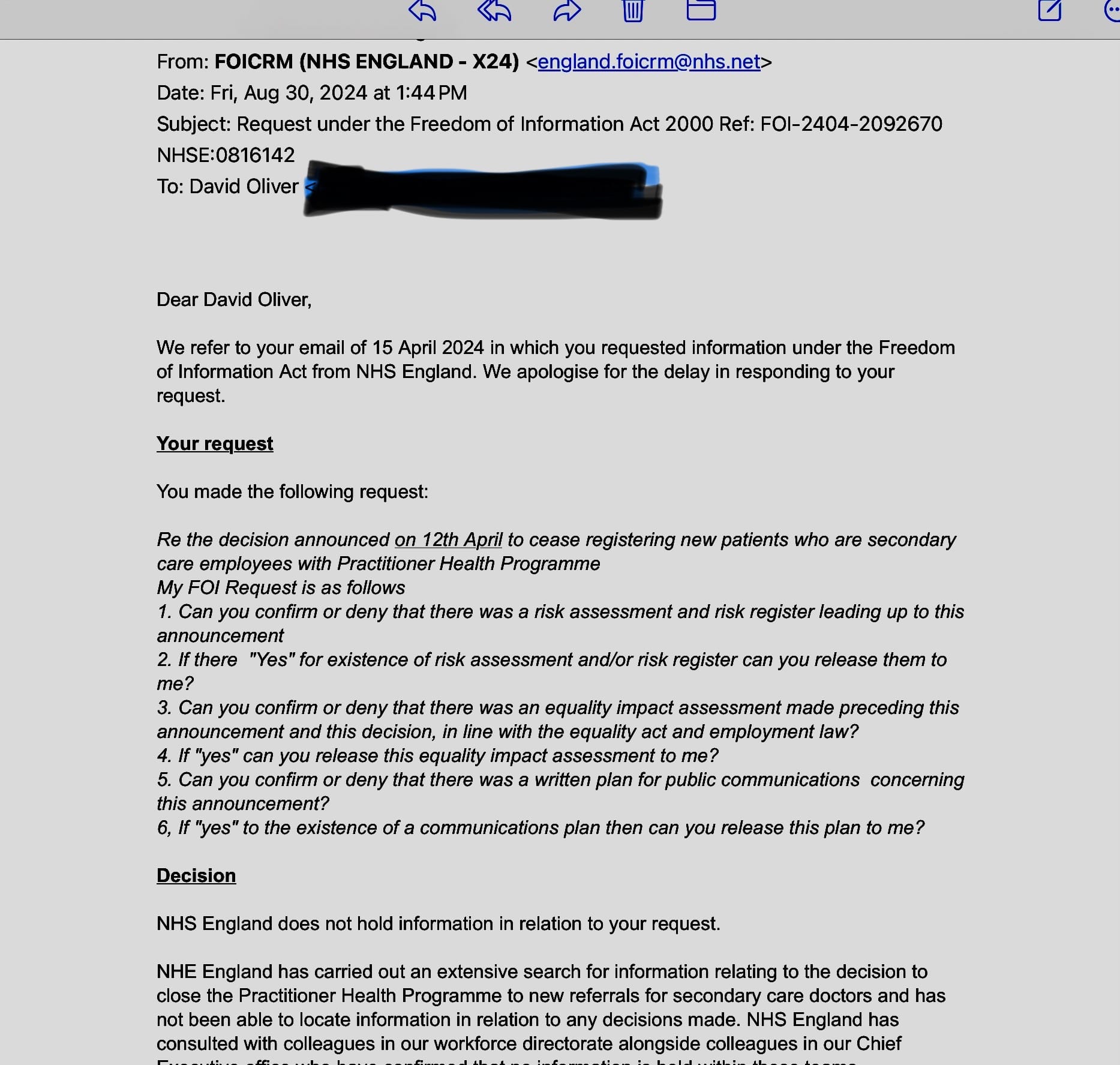Cowper’s Cut 338: September Gurls

Internal BMA backlash against militant anti-Cass tendency
The British Medical Association finds itself beset by avoidable, irrelevant internal politics which are not about medical politics, but identity politics. What a surprise.
I spotted this emerging quite a few weeks ago on Kiss (formerly Twitter), then the BMA made their statement at the end of July, and it is now in the plain open.

The Times’ Eleanor Hayward spotted that the issue has led to resignations of members with five decades of standing in the trades union. Deputy chair of BMA Council Emma Runswick seems to be the principal proponent of the militant anti-Cass tendency on Council.
Dr Jacky Davis, a consultant radiologist and member of the BMA council who opposed the motion, told Hayward, “The BMA council contains a vocal minority who have an anti-Cass agenda. They are driving policy in a direction that the membership have not been consulted on and do not agree with.
“This minority has voted to block the implementation of Cass, an evidence-based review which took four years to put together. They have no evidence for their opposition. The Cass review is not a matter for a trade union. It is not our business as a union to be doing a critique of the Cass review. It is a waste of time and resources.”
This is Jacky Davis: not exactly known for her lack of political radicalism, but at heart, always been one of the BMA ‘sensibles’.

There were further leaks to The Guardian’s Denis Campbell about a ‘witch hunt’, intended to “try to identify which senior figure leaked that it was set to oppose the landmark Cass review on transgender healthcare … (the BMA executive) warned its ruling council’s 69 members that whoever tipped off the media about its stance should own up or face their non-cooperation being seen as “an act of dishonesty”.
“Rachel Podolak, the union’s joint chief executive, told Council members that an investigation into the leak had been launched, and that the culprit should reveal themselves.
“In a message posted on the council’s message board the day after the motion was passed, Podolak scolded whoever had leaked details of the two Cass-related motions and made clear that, because the confidentiality of council proceedings had been breached, “we are investigating further”.”

Hannah Barnes’ long read for the Sunday Times is worth exploring, for vital context.
The Cass Review is a methodologically credible and deeply humane attempt to ensure that medical treatment for gender dysphoria should be evidence-based and holistic.
Having won decent offers for its members in the industrial disputes over pay, a big faction of Council members are making a belated bid for Olympic-style glory in the ‘sprinting back towards your comfort zone of identity politics and nonsense’ event.
NHS England, making shit up as they go along (again)
You’ve got to love NHS England, possibly.


As indeed it didn’t.

Professor David Oliver FOI’d the process behind the decision-making regarding this, and got a quite extraordinary reply.
His request was “Re the decision announced on 12th April to cease registering new patients who are secondary care employees with Practitioner Health Programme. My FOI Request is as follows
1. Can you confirm or deny that there was a risk assessment and risk register leading up to this announcement
2. If there "Yes" for existence of risk assessment and/or risk register can you release them to me?
3. Can you confirm or deny that there was an equality impact assessment made preceding this announcement and this decision, in line with the equality act and employment law?
4. If "yes", can you release this equality impact assessment to me?
5. Can you confirm or deny that there was a written plan for public communications concerning this announcement?
6. If "yes" to the existence of a communications plan, then can you release this plan to me?”
NHS England replied, which is unusual.
They replied late, of course, because this is NHS England and a FOI request. Their reply stated that NHSE “does not hold information in relation to your request.
“NHE England has carried out an extensive search for information relating to the decision to close the Practitioner Health Programme to new referrals for secondary care doctors and has not been able to locate information in relation to any decisions made. NHS England has consulted with colleagues in our workforce directorate alongside colleagues in our Chief Executive office who have confirmed that no information is held within these teams.
“It may be of interest to you that the Practitioner Health Programme was reinstated. Further details of the NHS Practitioner Health Programme is available on our website.”
So we are to believe that NHS England did no risk assessment, no equality impact assessment and no communications plan in relation to this announcement that would reduce access to support to NHS doctors.
NHS England could well be lying about this, to avoid the embarrassment of having to release such toxic material. They are a poorly-led, shit and dying organisation, and just straight-up lying along these lines would be wildly unsurprising.
On the other hand, they might actually be incompetent and stupid enough to have failed to do all of these things about a decision which was going to impact on the safety of doctors.
It is slightly difficult to decide which of these two scenarios would be worse. You can imagine the career-shortening impact of this sort of thing if it had been done under the leadership of either David Nicholson or Simon Stevens.
Under Amanda Pritchard, this kind of absurdity is clearly just par for the course.
£3 billion to buy off the immediate crisis?

The Times’ Chris Smyth reports that the NHS Confederation has put a number on what is needed in the 30 October Budget to fund the pay awarded and buy off the overspend in the NHS. And that number is £3.2 billion.
Confed CE Matthew Taylor, who nodded along with Labour advisor Professor Paul Corrigan’s suggestion that the NHS should not incessantly lobby for more money, said, “we need money to help us reduce the risks of winter as soon as possible. If there isn’t going to be more money the government has got to be very clear about their expectations for the NHS as well as honest with patients that waiting times and performance will deteriorate.”
Taylor warned of “a genuine risk of a full-on winter crisis” if this cash is not found: “we know there are all kinds of demands on taxpayers and governments have to make tough choices”.
Oh dear. Mr Taylor has been in the Confed job for three years now, which is more than long enough to know that any serious winter crisis investment has to be made at the start of the calendar year in question. Anything announced at the end of October 2024 will not make any meaningful difference to the 2024-25 winter, which is already certain to be yet another dreadful one.
Privates on parade
New analysis from the Health Foundation shared with the Financial Times shows an increase in the number of private orthopaedic surgeries. The article notes that “the (research) findings scotch the notion that delays within the state health service — where 7.6 million are waiting for non-urgent care — have driven a structural shift in the number of patients opting for private treatment.
“Privately funded elective inpatient activity in England grew by about 10.2 per cent between 2019-20 and 2022-23. This represented a small increase in the overall proportion of inpatient elective care paid for privately — from 7.4 per cent in 2019-20 to 8.3 per cent in 2022-23”.
Sign of the times: a call for OBR evaluation of PFI
A new bout of PFI is, as I keep writing, probably a bit under-priced in political betting stakes. I don’t say this because I think it’s a terribly good idea. I just think the Labour Government’s a priori position-taking may at some point make it look inevitable.

So it was interesting to see Labour MP Stella Creasy’s attempted amendments to the Budget Responsibility Bill, which would get the Office for Budgetary Responsibility to evaluate the costs and benefits of, among other things, the Private Finance Initiative cumulatively - all of the outstanding PFI deals.
This is a backbench amendment, and like all such, it stands very little chance of passing into law. But it’s notable that a fairly shrewd MP has spotted the issue of PFI, and wants to fire a warning shot against the development of a warm bath of consensus that PFI would de facto be an effective and efficient means of getting the infrastructure investment that so much of the public realm requires.
PFI is one way of doing government debt. It’s a very expensive one, and it ought not to be the default because other options look too hard.
NHS management capacity and capability: a new review
I have banged on many times, here and elsewhere, about the impact on operational and system performance from the Lansley reforms’ 45% cut to NHS management.
The work done by those people in the cut posts didn’t stop needing to be done (indeed, the Lansley reforming introduced more complexity with commissioning and tendering). It just stopped being done by professional managers, and started being done by clinicians.

So it’s good to see that Professor Ian Kirkpatrick and colleagues from the University of York have been commissioned by the Health Foundation to do a new review of the current state of NHS management.
We know what the broad outcome of the findings will be: the NHS has been under-managed by international standards for a long time. But it remains useful to have up-to-date evidence.
Truss fund
The new book by Anthony Seldon on Liz ‘The Lettuce’ Truss’ 49-day premiership reports a conversation among The Lettuce’s advisors in which serious consideration was given to “stopping cancer treatment on the NHS”.
Wow.
The Guardian reports a spokesperson for Truss saying, “it is completely untrue that she ever considered it.” Kwasi Kwarteng, who was The Lettuce’s chancellor, said: “I wasn’t involved in any conversations about restricting healthcare, but that doesn’t mean the prime minister and her team didn’t discuss this.”
The paper’s report of events claims that “one person familiar with the conversation said the suggestion to cut NHS cancer care came not from Truss herself but from the Treasury, as an illustration of what it would take to fix the black hole in the public finances”.
It is telling if unsurprising about The Lettuce Supremacy for the notion of stopping cancer treatment on the NHS to have been taken seriously for even a nanosecond. The sheer practical impossibility - making all oncologists, cancer surgeons and cancer nurses (not to mention hundreds of radiologists) instantly redundant; closing cancer units; stopping chemotherapy, radiotherapy and surgery - should have been obvious.
The fact that this didn’t spill out into the public domain before now speaks incredibly ill of those many people involved who had knowledge of this.
Recommended and required reading
New series of Financial Times articles on cancer treatment.
BBC News reports that the NHS in Wales in in a recurring deficit situation.
Health Service Journal reports that Medway NHS Foundation Trust is in the shit yet again, having to investigate obviously sexist and racist comments from a senior manager that were made on a work video call.
The Tony Blair Institute’s AI fetish is no better explained by Tony Blair himself, in this book-promotion interview with The Observer’s Andrew Rawnsley.
Oh good: humble, self-effacing Sir Stephen Bubb is back, trying to promote himself, sorry, the charity and voluntary sectors as a solution to something.
Phil Whitaker’s New Statesman long read on the row over PAs.



